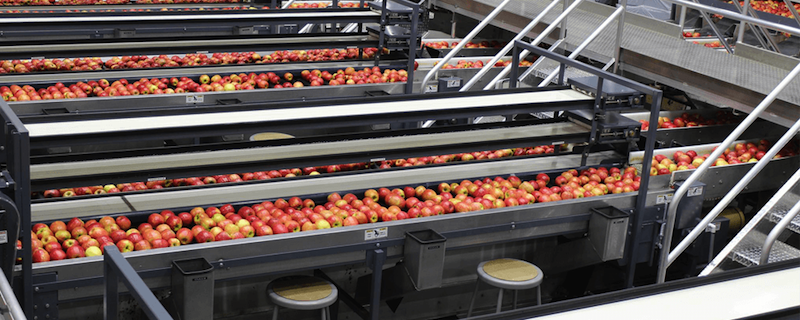
We all know that skilled labor is becoming more difficult to find and increasingly expensive to keep. This is a particular concern in America where a labor shortage means that packhouses are competing for staff by accommodating, transporting and feeding workers, and yet there’s still no guarantee they’ll show up for work. Labor is one of a packhouse’s largest overheads and leveraging technology can reduce this number and make the packhouse more efficient. Automating tasks with machinery allows you to be more flexible and accurate, positively affecting the bottom line.
The best example of the benefits of reducing labor is our latest product, Spectrim. Our first Spectrim peach packhouse, Titan Farms, reduced grading labor from 48 to 12 while our first Spectrim apple packhouse, Washington Fruit, removed all of their manual sorting labor.
“Since Spectrim, we’ve needed a smaller crew to run the line efficiently, a typical shift had 16 people sorting and now a typical shift has nobody sorting and we’re also able to run faster” – Mikey Hanks, System Operator at Washington Fruit
While there are obvious overhead benefits of this reduction in labor, I want to dive into how this actually drives tangible business value in other areas:
Packs per hour
Increasing packs-per-hour affects the revenue of the packhouse, the more packs produced, the more packs that are sold for the same amount of effort. When packing with an inspection platform like Spectrim, the main reason you get an increase in packs-per-hour is that you don’t need to slow down when defect is heavy, meaning that there is no grading bottleneck so you can run at full capacity all the time, operating at the capacity of your sorting line rather than the capacity of the people who were once manually grading. This means you’re running more fruit in the same period so are maximizing both throughput and revenue for the packhouse.
Cost-per-pack
While reducing labor overheads obviously reduces the cost of running the packhouse, the more tangible metric is cost-per-pack/tray/box/punnet/etc. By reducing grading labor and increasing throughput, Spectrim has a two-fold impact on cost per pack, improving grower returns and maximizing the margin for the packhouse and throughout the supply chain.
Labor utilization
The nice thing to know when Spectrim is looking after grading, is that you only need to rely on one person – the operator. This means you can move the extra people to packing or picking to help with the rest of your business. It also means you don’t have to keep staff on standby to handle the variety of requirements for operating the packhouse, giving you the confidence to respond to whatever quality produce comes in and whatever grades your customers want.
Other benefits of removing labor from the packing line:
- Increase in accuracy and repeatability – completely automating your sorting and grading removes any subjective bias caused by humans and gives the packhouse the ability to grade to an exact specification. This ensures the right fruit is getting into the right box which protects and enhances your fresh produce brands.
- Less human error – no one is perfect, and everyone is prone to making mistakes. Incorrectly downgrading produce can cost your packhouse, as you are giving away quality produce to the market and not being rewarded for it.
- Increased safety – removing human interaction in a packing line reduces the risk of injury within the packhouse and also reduces food safety risk, as hands are kept off the fruit.
While Spectrim may remove graders from your packing line, the impact of fully automated grading is actually much wider for the internal efficiencies of a packhouse. On top of that, it also improves quality and consistency, functionality, and the future of your packing operation.



